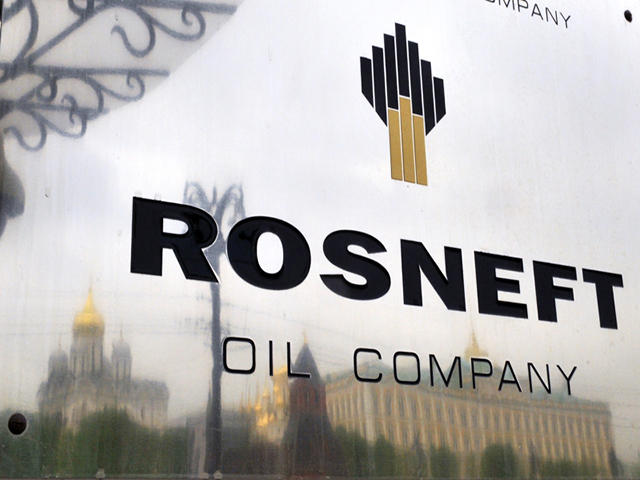
OAO Rosneft, the Russian state-run oil company targeted by international sanctions, posted the biggest weekly gain since June in U.S. trading as a cease-fire in Ukraine eased concern that the financial penalties will erode profits.
Rosneft, the world’s largest publicly traded oil producer by output, rose 6.6 percent in New York Sept. 5. The stock gained 5.7% for the week. The Bloomberg Russia-US Equity Index rose 2.5% to 88.35, pushing its weekly gain to 5.2%.
Equities rallied after Ukraine signed a cease-fire agreement with pro-Russian separatists. The truce came as the European Union moved toward imposing new penalties on Russia for allegedly supporting the insurgents. Kremlin officials deny involvement. Rosneft is one of the stocks most vulnerable to sanctions as it was targeted by US measures on July 16, barring the company from accessing American markets to finance debt with maturities above 90 days.
“It’s a relief rally for the market, and Rosneft is benefiting from the sentiment,” Mattias Westman, chief executive officer of London-based Prosperity Capital Management Ltd., said by phone. “With the cease-fire agreement in place, the risk of further sanctions has reduced substantially. And the chance of lifting the existing sanctions is higher now, although it will take a while.”
Rosneft has total debt of $72.4billion, including $13.3billion due at the end of 2014. It reported second-quarter adjusted net income of $4.89billion, data compiled by Bloomberg show.
The company has asked the state for as much as 1.5 trillion rubles ($40.5billion) of aid, a government official, who asked not to be identified because the matter is confidential, said on Aug. 14. Economy Minister Alexei Ulyukayev said on Aug. 26 that Rosneft “has a problem replacing the funding absent in global markets,” while its financing needs are far lower than 1.5trillion rubles.
Rosneft, which became the largest oil producer when it acquired BP Plc.’s joint venture TNK-BP for $55billion in 2013, rose to $6.29 last week in New York.
Investors pulled a net $34million from Russia-dedicated equity funds in the week through Sept. 3, the biggest weekly outflow since the five days ending Aug. 20, said Cameron Brandt, research director at EPFR Global, a Cambridge, Massachusetts- based company that tracks fund flows.
Futures on the dollar-denominated RTS index expiring this month fell less than 0.1% to 125,930 in US hours on Sept. 5. The RTS Volatility Index, which measures expected swings in futures, decreased 4.5% to 29.88.
“Sanctions will never end in the foreseeable future and will cripple the Russian economy,” Slava Rabinovich, the chief executive officer at Diamond Age Capital Advisers in Moscow, which manages $240million in Russian assets, said by phone on Sept. 5. “New sanctions on Russia will be approved regardless of a cease-fire. What’s next? What kind of a road-map does Russia have to get out of this?”
The punitive measures are worsening a slowdown in growth that Russia had already projected before sanctions were imposed to be the weakest in five years. The economy will expand 0.5% this year, the least since a 2009 contraction, according Economy Ministry forecasts.
EU diplomats met in Brussels on Sept. 5 to discuss new sanctions against Russia. President Barack Obama said the US has readied penalties to be enacted in coordination with EU governments.
The US previously froze the assets of Rosneft Chief Executive Officer Igor Sechin and banned him from travelling to America. Other international sanctions have targeted the banking and defense industries with measures including financing restrictions and export bans.
The US and EU are limiting the transfer of certain oilfield technologies into Russia that are needed to develop its oil and gas fields in shale rock formations, deep water offshore and in the Arctic. That will include horizontal drilling and hydraulic fracturing, which has helped boost North American crude production and set the US on a course toward energy independence.
“There is no reason for excessive optimism at the moment,” Dmitry Polevoy, the chief economist for Russia at ING Groep NV in Moscow, wrote in a Sept. 5 note to clients. “The protocol sets ground for diplomatic resolution of the crisis and serves as an important milestone. At the same time, all will depend on the pace of implementation with market remembering the previous agreement in June, which failed to materialize on the ground.”
Russian stocks rallied after political leaders discussed a possible truce on June 18 and then reversed gains in July as violence continued.
The equity market will extend advances “if the agreed cease-fire is indeed sustained and provides ground for further talks to solve the crisis,” Polevoy wrote.
Recommended for you
